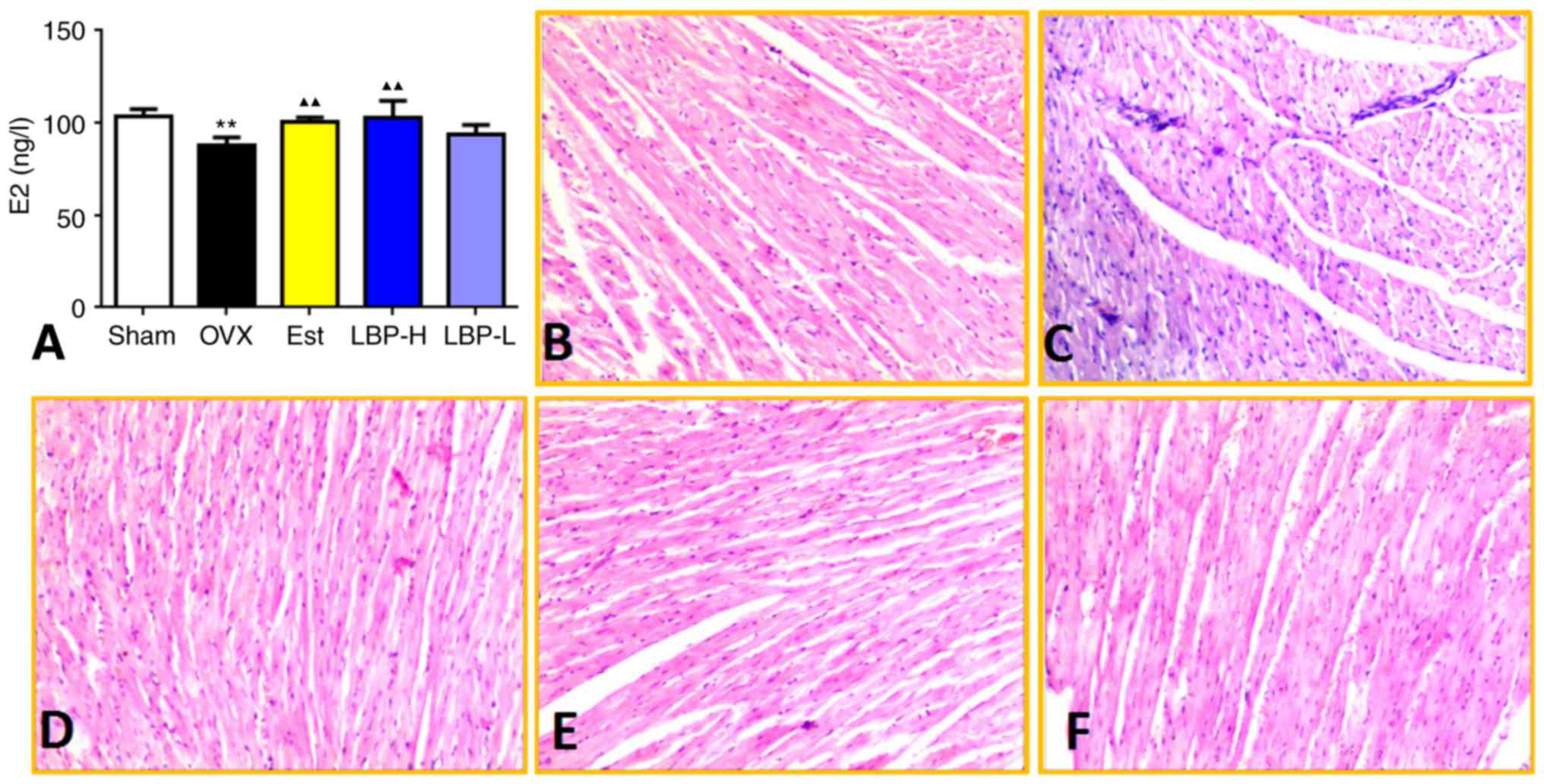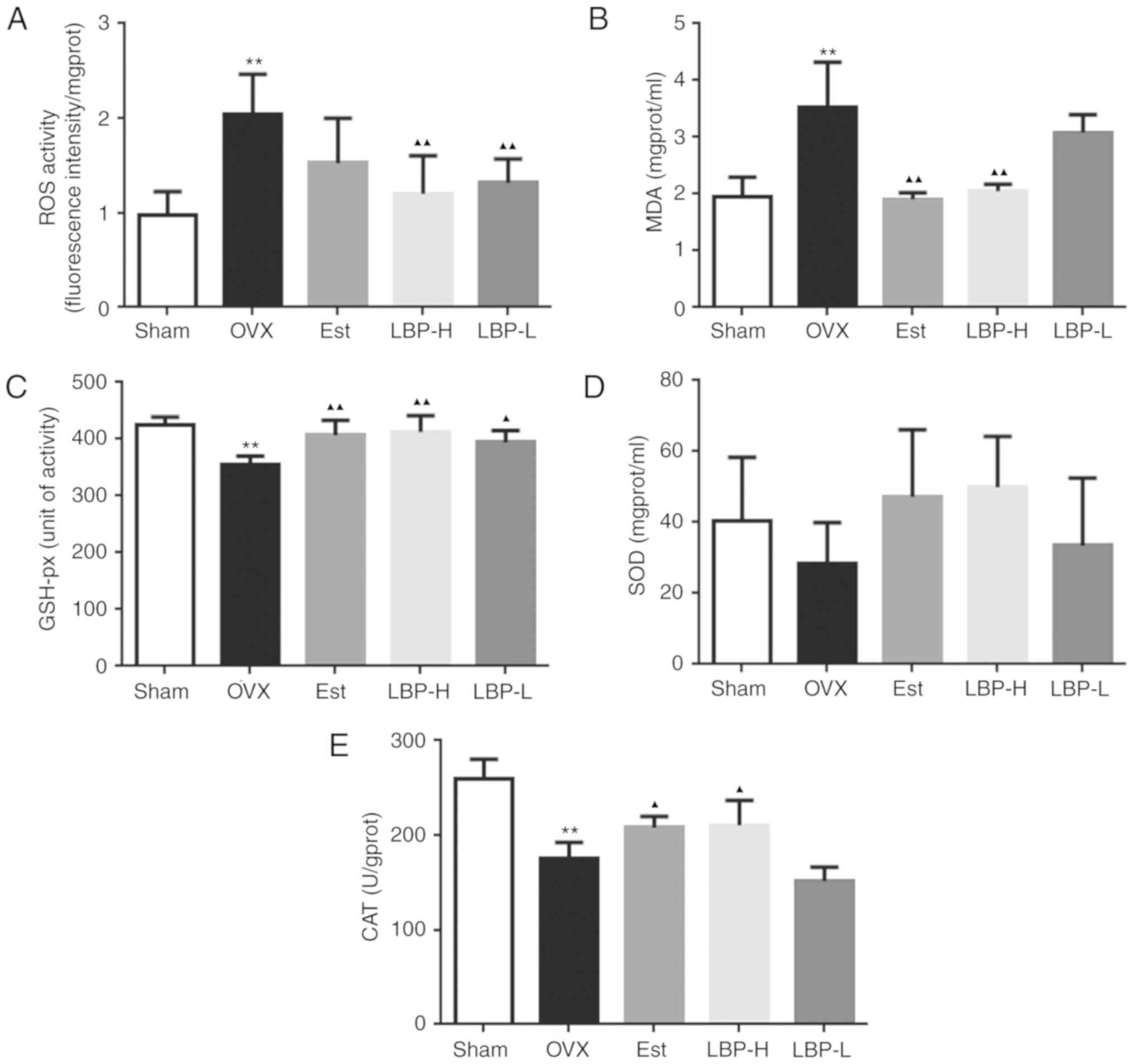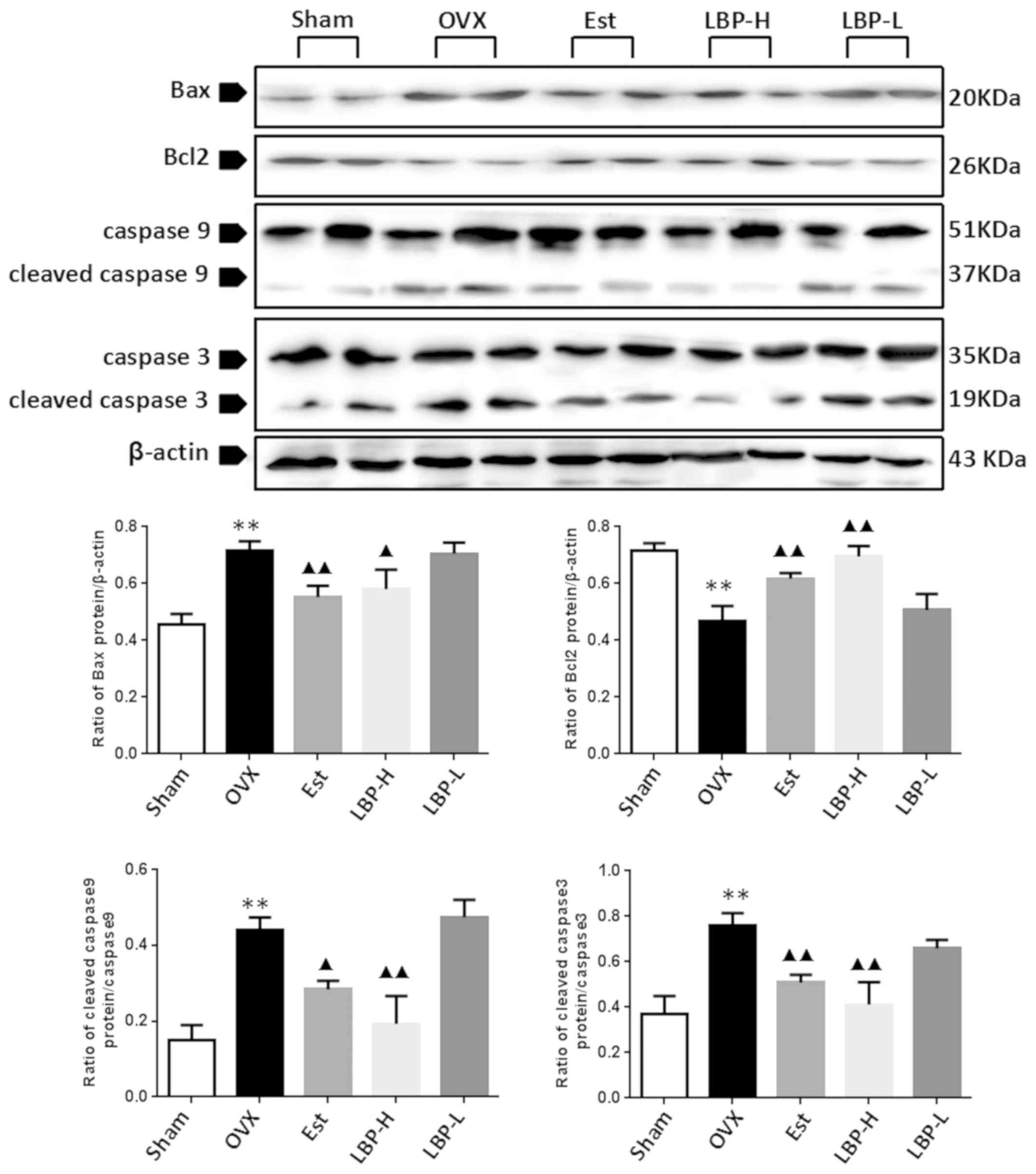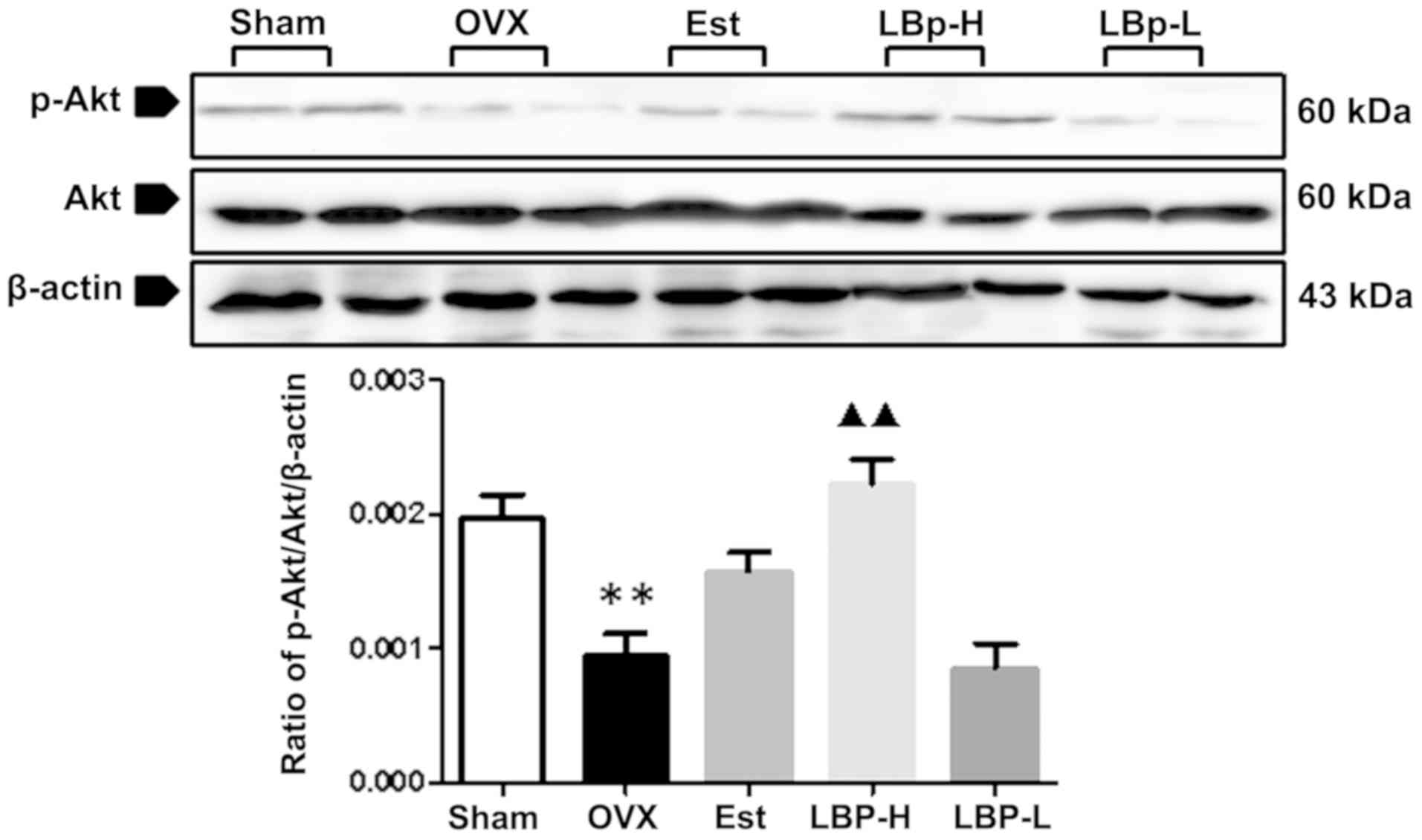|
1
|
Mendelsohn ME and Karas RH: Molecular and
cellular basis of cardiovascular gender differences. Science.
308:1583–1587. 2005. View Article : Google Scholar : PubMed/NCBI
|
|
2
|
Rossouw JE, Prentice RL, Manson JE, Wu L,
Barad D, Barnabei VM, Ko M, LaCroix AZ, Margolis KL and Stefanick
ML: Postmenopausal hormone therapy and risk of cardiovascular
disease by age and years since menopause. JAMA. 297:1465–1477.
2007. View Article : Google Scholar : PubMed/NCBI
|
|
3
|
Arias-Loza PA, Muehlfelder M and Pelzer T:
Estrogen and estrogen receptors in cardiovascular oxidative stress.
Pflugers Arch. 465:739–746. 2013. View Article : Google Scholar : PubMed/NCBI
|
|
4
|
Wang F, Xiao J, Shen Y, Yao F and Chen Y:
Estrogen protects cardiomyocytes against lipopolysaccharide by
inhibiting autophagy. Mol Med Rep. 10:1509–1512. 2014. View Article : Google Scholar : PubMed/NCBI
|
|
5
|
Rossouv JE, Prentice RE, Manson JE, Wu L,
Barad D, Barnabei VM, Ko M, LaCroix AZ, Margolis KL and Stefanick
ML: Postmenopausal hormone 1therapy and risk of cardiovascular
disease by age and years since menopause. JAMA. 297:1465–1477.
2007.PubMed/NCBI
|
|
6
|
Babiker FA, DeWindt LJ, Van Eickels M,
Grohe C, Meyer R and Doevendans PA: Estrogenic hormone action in
the heart: Regulatory network and function. Cardiovasc Res.
53:709–719. 2002. View Article : Google Scholar : PubMed/NCBI
|
|
7
|
Zegura B, Keber I, Sebestjen M and Koenig
W: Double blind, randomized study of estradiol replacement therapy
on markers of inflammation, coagulation and fibrinolysis.
Atherosclerosis. 168:123–129. 2003. View Article : Google Scholar : PubMed/NCBI
|
|
8
|
Miller VM and Duckles SP: Vascular actions
of estrogens: Functional implications. Pharmacol Rev. 60:210–241.
2008. View Article : Google Scholar : PubMed/NCBI
|
|
9
|
Knowlton AA and Lee AR: Estrogen and the
cardiovascular system. Pharmacol Ther. 135:54–70. 2012. View Article : Google Scholar : PubMed/NCBI
|
|
10
|
Ni W, Gao T and Wang H: Anti-fatigue
activity of polysaccharides from the fruits of four Tibetan plateau
indigenous medicinal plants. J Ethnopharmacol. 150:529–535. 2013.
View Article : Google Scholar : PubMed/NCBI
|
|
11
|
Xiao J, Xing F, Huo J, Fung ML, Liong EC,
Ching YP, Xu A, Chang RC, So KF and Tipoe GL: Lycium barbarum
polysaccharides therapeutically improve hepatic functions in
non-alcoholic steatohepatitis rats and cellular steatosis model.
Sci Rep. 4:55872014. View Article : Google Scholar : PubMed/NCBI
|
|
12
|
Giordano FJ: Oxygen, oxidative stress,
hypoxia and heart failure. J Clin Invest. 115:500–508. 2005.
View Article : Google Scholar : PubMed/NCBI
|
|
13
|
Saglam H, Kaya E, Cemek M, Ciçek Y, Kulac
M and Karaca S: No apparent correlation between Behçet's disease
and oxidative stress disturbance. Clin Hemorheol Microcric.
44:287–296. 2010.
|
|
14
|
El-Sayyad HI, AI-Haggar MS, EI-Ghawet HA
and Bakr IH: Cardiomyopathy and angiogenesis defects of Wistar rat
fetuses of diabetic and hypercholesterolemic mothers. Nutrition.
28:e33–e43. 2012. View Article : Google Scholar : PubMed/NCBI
|
|
15
|
Tang Q, Len Q, Liu Z and Wang W:
Overexpression of miR-22 attenuates oxidative stress injury in
diabetic cardiomyopathy via Sirt 1. Cardiovasc Ther. 36:2017.doi:
10.1111/1755-5922.12318.
|
|
16
|
Mallat Z, Philip I, Lebret M, Chatel D,
Maclouf J and Tedgui A: Elevated levels of 8-iso-prostaglandin
F2alpha in pericardial fluid of patients with heart failure: A
potential role for in vivo oxidant stress in ventricular dilatation
and progression to heart failure. Circulation. 97:1536–1539. 1998.
View Article : Google Scholar : PubMed/NCBI
|
|
17
|
Xin YF, Wan LL and Peng JL: Alleviation of
the acute doxorubicin-induced cardiotoxicity by Lycium barbarum
polysaccharides through the suppression of oxidative stress. Food
Chem Toxicol. 49:259–264. 2011. View Article : Google Scholar : PubMed/NCBI
|
|
18
|
Lu SP and Zhao PT: Chemical
characterization of Lycium barbarum polysaccharides and their
reducing myocardial injury in ischemia/reperfusion of rat heart.
Int J Biol Macromol. 47:681–684. 2010. View Article : Google Scholar : PubMed/NCBI
|
|
19
|
Poumeau-Delille G: Techniques biologiques
en endocrinologie experimentale chez rat. Masson and Cie. 1953.
|
|
20
|
Bolego C, Cignarella A, Ruzza R, Zaarour
C, Messi E, Zanisi M and Puglisi L: Differential effects of low-
and high-dose estrogen treatments onvascular responses in female
rats. Life Sci. 60:2291–2302. 1997. View Article : Google Scholar : PubMed/NCBI
|
|
21
|
Persky AM, Green PS, Stubley L, Howell CO,
Zaulyanov L, Brazeau GA and Simpkins JW: Protective effect of
estrogens against oxidativedamage to heart and skeletal muscle in
vivo and in vitro. Proc Soc Exp Biol Med. 223:59–66. 2000.
View Article : Google Scholar : PubMed/NCBI
|
|
22
|
Patten RD, Pourati I, Aronovitz MJ, Ali
AA, Eder S, Force T, Mendelsohn ME and Karas RH: 17 Beta-estradiol
differentially affects left ventricular and cardiomyocyte
hypertrophy following myocardial infarction and pressure overload.
J Cardiac Fail. 14:245–253. 2008. View Article : Google Scholar
|
|
23
|
Tagashira H, Bhuiyan S, Shioda N and
Fukunaga K: Distinct cardioprotective effects of 17β-estradiol and
dehydroepiandrosterone on pressure overload-induced hypertrophy in
ovariectomized female rats. Menopause. 12:1317–1326. 2011.
View Article : Google Scholar
|
|
24
|
Aldini G, Yeum KJ, Niki E, et al:
Biomarkers for antioxidant defense and oxidative damage: Principles
and practical applications. Ames. Wiley-Blackwell. 2010.
|
|
25
|
Castelao JE and Gago-Dominguez M: Risk
factors for cardiovascular disease in women: Relationship to lipid
peroxidation and oxidative stress. Med Hypotheses. 71:39–44. 2008.
View Article : Google Scholar : PubMed/NCBI
|
|
26
|
Zhu X, Tang Z, Cong B, Du J, Wang C, Wang
L, Ni X and Lu J: Estrogens increase cystathionine-γ-lyase
expression and decrease inflammation and oxidative stress in the
myocardium of ovariectomized rats. Menopause. 20:1084–1091. 2013.
View Article : Google Scholar : PubMed/NCBI
|
|
27
|
Tang Z, Wang Y, Zhu X, Ni X and Lu J:
Exercise increases cystathionine-γ-lyase expression and decreases
the status of oxidative stress in myocardium of ovariectomized
rats. Int Heart J. 57:96–103. 2016. View Article : Google Scholar : PubMed/NCBI
|
|
28
|
Liochev SI and Fridovich I: Arch Biochem
Biophys. 337:115–120. 1997.PubMed/NCBI
|
|
29
|
Wu HT, He XJ, Hong YK, Ma T, Xu YP and Li
HH: Chemical characterization of lycium barbarum polysaccharides
and its inhibition against liver oxidative injury of high-fat mice.
Int J Biol Macromol. 46:540–543. 2010. View Article : Google Scholar : PubMed/NCBI
|
|
30
|
Aksakal E, Akaras N, Tanboga IH, Kurt M,
Halici Z, Odabasoglu F and Unal B: Relationship between oxidative
stress and cardiomyopathic changes in ovariectomized rats.
Cardiology. 119:235–241. 2011. View Article : Google Scholar : PubMed/NCBI
|
|
31
|
Ji H, Zheng W, Menini S, Pesce C, Kim J,
Wu X, Mulroney SE and Sandberg K: Female protection in progressive
renal disease is associated with estradiol attenuation of
superoxide production. Gend Med. 4:56–71. 2007. View Article : Google Scholar : PubMed/NCBI
|
|
32
|
Urata Y, Ihara Y, Murata H, Goto S, Koji
T, Yodoi J, Inoue S and Kondo T: 17Beta-estradiol protects against
oxidative stress-induced cell death through the
glutathione/glutaredoxin-dependent redox regulation of Akt in
myocardiac H9c2 cells. J Biol Chem. 281:13092–13102. 2006.
View Article : Google Scholar : PubMed/NCBI
|
|
33
|
Sawicka E and Długosz A: The role of
17β-estradiol metabolites in chromium-induced oxidative stress. Adv
Clin Exp Med. 26:215–221. 2017.PubMed/NCBI
|
|
34
|
Baeza I, Fdez-Tresguerres J, Ariznavarreta
C and De la Fuente M: Effects of growth hormone, melatonin,
oestrogens and phytoestrogens on the oxidized glutathione
(GSSG)/reduced glutathione (GSH) ratio and lipid peroxidation in
aged ovariectomized rats. Biogerontology. 11:687–701. 2010.
View Article : Google Scholar : PubMed/NCBI
|
|
35
|
Wu SJ, Ng LT and Lin CC: Antioxidant
activities of some common ingredients of traditional Chinese
medicine, Angelica sinensis, Lycium barbarum and Poriacocos.
Phytother Res. 18:1008–1012. 2004. View
Article : Google Scholar : PubMed/NCBI
|
|
36
|
Luo Q, Cai Y, Yan J, Sun M and Corke H:
Hypoglycemic and hypolipidemic effects and antioxidant activity of
fruit extracts from Lycium barbarum. Life Sci. 76:137–149. 2004.
View Article : Google Scholar : PubMed/NCBI
|
|
37
|
Potterat O: Goji (Lycium barbarum and L.
Chinense): Phytochemistry, pharmacology and safety in the
perspective of traditional uses and recent popularity. Planta. Med.
76:7–19. 2010.
|
|
38
|
Li XM: Protective effect of Lycium
barbarum polysaccharides on streptozotocin-induced oxidative stress
in rats. Int J Biol Macromol. 40:461–465. 2007. View Article : Google Scholar : PubMed/NCBI
|
|
39
|
Luo Q, Li Z, Huang X, Sun M and Corke H:
Lycium barbarum polysaccharides: Protective effects against
heat-induced damage of rat testes and
H2O2-induced DNA damage in mouse testicular
cells and beneficial effect on sexual behavior and reproductive
function of hemicastrated rats. Life Sci. 79:613–621. 2006.
View Article : Google Scholar : PubMed/NCBI
|
|
40
|
Martindale JL and Holbrook N: Cellular
response to oxidative stress: Signaling for suicide and survival. J
Cell Physiol. 192:1–15. 2002. View Article : Google Scholar : PubMed/NCBI
|
|
41
|
Saito Y, Nishio K, Ogawa Y, Kinumi T,
Yoshida Y, Masuo Y and Niki E: Molecular mechanisms of
6-hydroxydopamine-induced cytotoxicity in PC12 cells: Involvement
of hydrogen peroxide-dependent and -independent action. Free Radic
Biol Med. 42:675–685. 2007. View Article : Google Scholar : PubMed/NCBI
|
|
42
|
Fujita H, Ogino T, Kobuchi H, Fujiwara T,
Yano H, Akiyama J, Utsumi K and Sasaki J: Cell-permeable cAMP
analog suppresses 6-hydroxydopamine-induced apoptosis in PC12 cells
through the activation of the Akt pathway. Brain Res 1113. 10–23.
2006. View Article : Google Scholar
|


















